Ex-Olympic medalist Ota continues mission of opening wrestling mat to those with Down syndrome
Wednesday, February 15, 2023 - 14:49 By Ikuo Higuchi

(Editor's Note: The following is an edited version of a two-part series that appeared on the Japan Wrestling Federation website on Jan. 18 with excerpts from previous stories. It has been translated and published by permission.)
"Through wrestling, society can be changed. Those with Down syndrome can be given courage by wrestling."
On the second floor of a non-descript building near Tokyo Dome in the heart of the city, the club members gathered in a small martial arts gym with a wall-to-wall mat to resume activities that, for some, date back to the start of the club in 2005.
Unavoidably suspended during the pandemic, the Waku-waku Wrestling Club -- specifically for those with Down syndrome -- was restarted in mid-January to central Tokyo, continuing the mission of its founder of enabling people with Down syndrome to become sharper physically and emotionally, and give them hope in life.
The club ("waku-waku" is an onomatopoeic expression of the feeling of excitement) is the lifework of Takuya OTA, the 1996 Atlanta Olympic bronze medalist at freestyle 74kg. "It has become a part of my life," says the 53-year-old Ota, who, following a long stint as coach at Waseda University, is currently the head coach at Chuo University. "I get my power to go on from these kids."
The flame of Ota's interest in helping those with Down syndrome was ignited after being deeply moved by the book "Tatta Hitotsu no Takaramono (The One and Only Treasure)," a mother's account of raising a son with the disorder published in 2004. The book by Hiromi Kato was made into a TV drama, titled "The One and Only," which won the Asian Television Award for drama in 2005.
When Ota started the project, he was already working full-time coaching world-class competitors at Waseda, Japan's longest-running team. He had also launched the Waseda Club for kids, fueled by his determination to spread the word about the wonders of wrestling to as many people as possible.
According to the Mayo Clinic website, Down syndrome is a "genetic disorder" caused by abnormal cell division during gestation, with the resulting extra genetic material causing "the developmental changes and physical features of Down syndrome."
It affects 1 in 1,000 newborns and varies in severity. The website notes: "Better understanding of Down syndrome and early interventions can greatly increase the quality of life for children and adults with this disorder and help them live fulfilling lives."
After reading Kato's book, Ota began to think to himself, "How would it be if I had them try wrestling?" For those who are often neglected or ignored by society and suffer from uninformed biases, could not wrestling be a means to help give them more worth to their lives?
In July 2005, he started the first wrestling club specifically for this purpose, taking under his wing an inaugural group of six kids.
That's not to say there were no initial concerns. Children with Down syndrome are not on the same physical level as their healthy peers, and there were some whose spines might not hold up to the rigors of wrestling. Was wrestling something they could do? But there was no way to know until they tried, and Ota wanted to give them the chance.
And given the chance, they showed that they were able to move around just like the others. Not so much at first, but as they got used to it, they gained strength and confidence. They began to understand the rules and learned the techniques as Ota put priority on safety and stopped any potentially dangerous action.

Just like any wrestling practice anywhere in Japan, Coach Takuya Ota addresses the wrestlers before the start as the Waku-Waku Wrestling Club resumed in January for the first time since the start of the pandemic. (Photo: Japanese Wrestling Federation)
Getting big names involved
Perhaps no observers were more surprised, and overjoyed, by the success of the project than the parents. They could see their children who had mostly been kept out of sports getting exercise, having fun and, most importantly, building their self-esteem.
In 2017, reigning world champion and future Olympic gold medalist Yui SUSAKI was in her freshman year at Waseda when she offered her time to the Waku-waku Wrestling Club.
"I became aware Waku-waku Wrestling from the federation website and other sources," Susaki said. "I thought that after entering college, I wanted to be involved, so I participated joined the practices once a month as a coach. Everyone in Waku-waku has a pure love for wrestling, and each time it stimulated me as well," she added with a glisten in her eyes.

Also coming on board to help out was Kenichi YUMOTO, the 60kg freestyle silver medalist at the 2008 Beijing Olympics with deep connections to Ota -- they are both natives of Wakayama Prefecture and alumni of Nippon Sports Science University. Yumoto made his presence felt at practices, patiently teaching techniques.
The club continued unabated until the coronavirus pandemic hit the world in 2020, leaving no sport unaffected. Ota's contract had just ended at Waseda and he made the move to Chuo University, which is located in the western Tokyo suburb of Hachioji. That left the club without the wrestling room at Waseda, and combined with the pandemic, caused a halt to the operations.
The recent easing of pandemic restrictions in Japan allowed the club to restart, and Ota was fortunate to make arrangements for use of the martial arts gym near Tokyo Dome in Bunkyo Ward. It was a special moment for everyone involved.
"People with Down syndrome are fundamentally averse to combative sports," he said. "But when they continue doing it, I find that their fighting spirit come out. I hear from parents, 'He's no longer timid' or 'He's become able to do things on his own.' I feel that the parents also sense that by wrestling, they have unlimited potential for personal growth."
While there were only five participants on that first day of restarting the club, the room was filled with a positive energy, from the smiles on their faces as they practiced moves to the way they proudly raised their hands when asked for sparring partners.
Among those taking the mat was 24-year-old Aruban Kubota, who was one of the original members of the club in 2005 as an elementary school first-grader. Kubota, whose first name is derived from his father's native country of Albania, is currently employed in a public welfare center.
"At first, he would always sit off to the side at practice," recalls his mother, Rimiko. "But before we knew it, he starting joining the group and would decide things by himself. He started acting on his own."
Rimiko says the wait for the club to restart seemed interminable. "I am so grateful to Coach Ota," she says.
In July 2009 , Ota, looking to give the members a chance to put their new-found skills to the same test as all wrestlers, organized the "1st Waseda Cup." Other clubs for Down syndrome kids had cropped up, mostly at the urging of Ota through his wrestling connections, and the tournament drew 29 entries from three clubs.
The tournament, which would later be renamed the "Waku-waku Waseda Cup" and gain sponsorship from a company employing former Waseda wrestlers, has drawn entries from children to adults in their 20s. The level continues to improve and, unlike in the early years when it was difficult for the participants to control their emotions, matches are no longer halted and can proceed smoothly.
"At first, our main objective was to just get them to be able to go out onto the mat by themselves," Ota said in an interview after the 2016 tournament. "Now, they understand the rules and can have what we would consider a regular match."
All participants receive a medal, but the highlight of the award ceremony is the selection of the MVP and Fighting Spirit Award which come with a trophy. As Ota holds the microphone before making the announcement, the winners (who are eligible for MVP) watch him as if in prayer while the whole venue takes on a atmosphere of smiles.
 A club member does a double-leg takedown drill as the others watch. (Photo: Japanese Wrestling Federation)
A club member does a double-leg takedown drill as the others watch. (Photo: Japanese Wrestling Federation)
Aiming for the Special Olympics
As could be seen by the enthusiasm at the 2021 Tokyo Paralympics, sports is not the exclusive dominion of the able-bodied. People with Down syndrome or other intellectual disabilities are also making strides toward participating in sports.
In October 2020, an athletics competition solely for those with Down syndrome was held in Miyazaki in southern Japan, and earlier this year, a division for Down syndrome entrants was set up for the first time at a swimming meet in Chiba, east of Tokyo.
On an international scale, Virtus, an organization established for the development of elite sport worldwide for athletes with intellectual impairments, had judo on the program at the 1st Oceania/Asian Games held in November last year in Australia. Japan athletes took part, widening the scope of opportunities for those with Down syndrome.
Ota is also looking beyond Japan's shores. Ota's next goal is to get wrestling into the Special Olympics, which has a history of over 50 years and differs from the Paralympics in that it is specifically for those with intellectual disabilities. Currently, there are over 20 sports in the Special Olympics, including judo.
Ota has visited the headquarters in Washington, D.C., where he was told that for wrestling to be included, it was necessary for the sport to expand in Japan and for more countries around the world to start programs. As it is still evolving and not well-known in Japan, it marks a high hurdle to be cleared.
But he is undaunted. "Even if you have a disability, as long as there is a sport providing a stage to shine, one can have a big presence in society," Ota said.
--Translation and editing by Ken Marantz

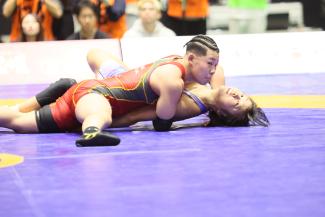
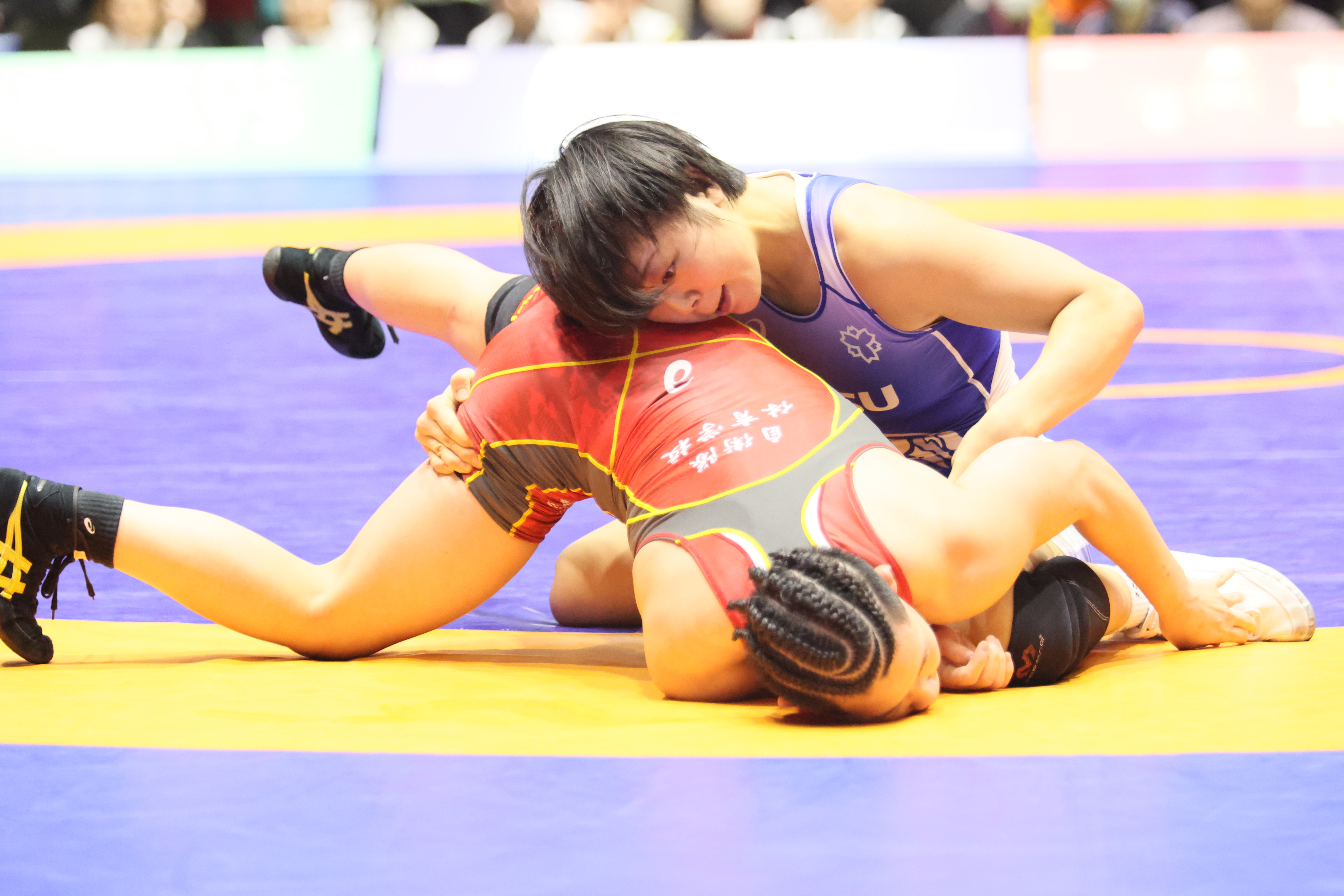 Akari FUJINAMI finishes up the winning takedown against Himeka TOKUHARA in the final minute of the women's 57kg final. (Photo: Takeo Yabuki / wrestling-spirits.jp)
Akari FUJINAMI finishes up the winning takedown against Himeka TOKUHARA in the final minute of the women's 57kg final. (Photo: Takeo Yabuki / wrestling-spirits.jp)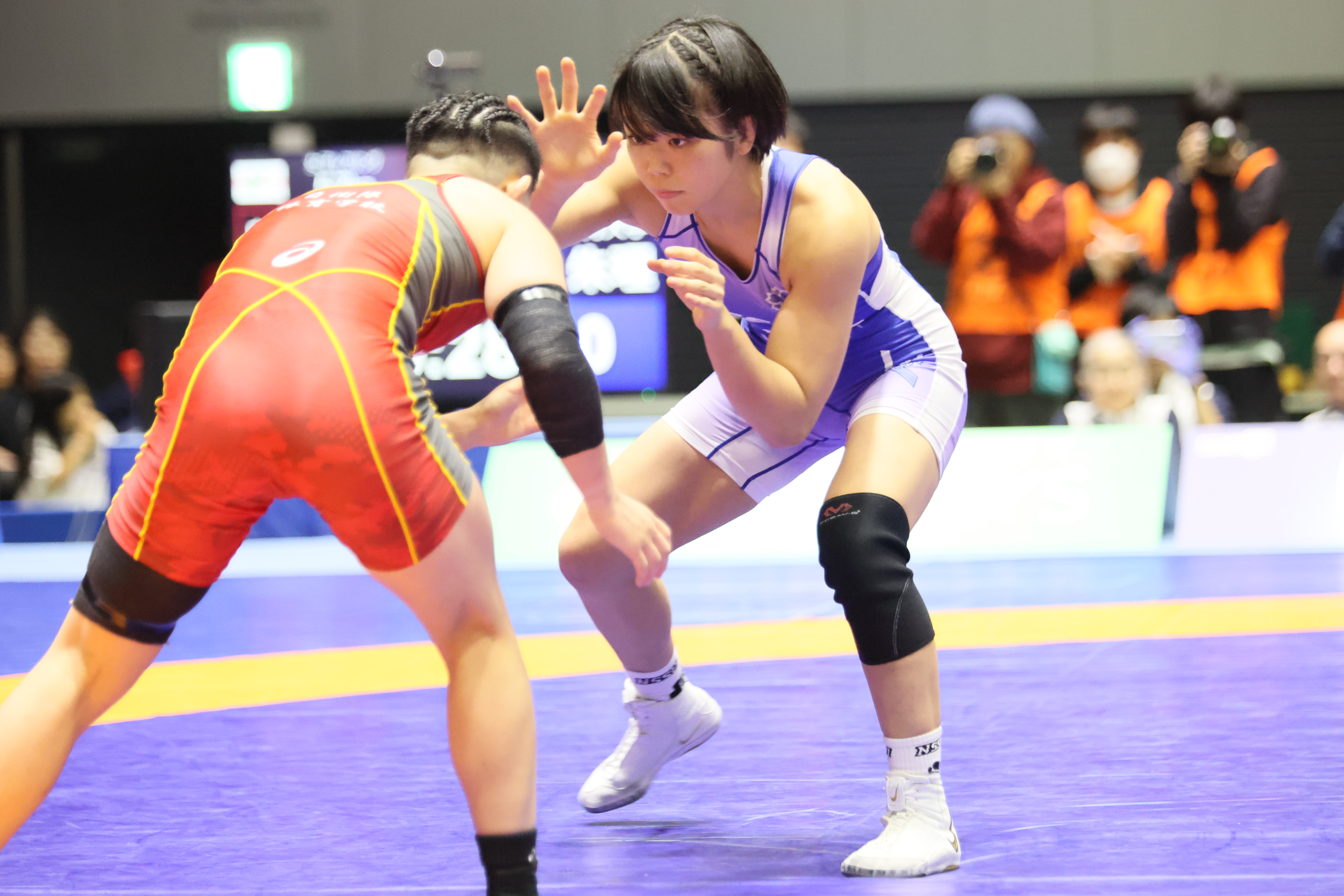 Akari FUJINAMI squares off with Himeka TOKUHARA in the women's 57kg final. (Photo: Takeo Yabuki / wrestling-spirits.jp)
Akari FUJINAMI squares off with Himeka TOKUHARA in the women's 57kg final. (Photo: Takeo Yabuki / wrestling-spirits.jp)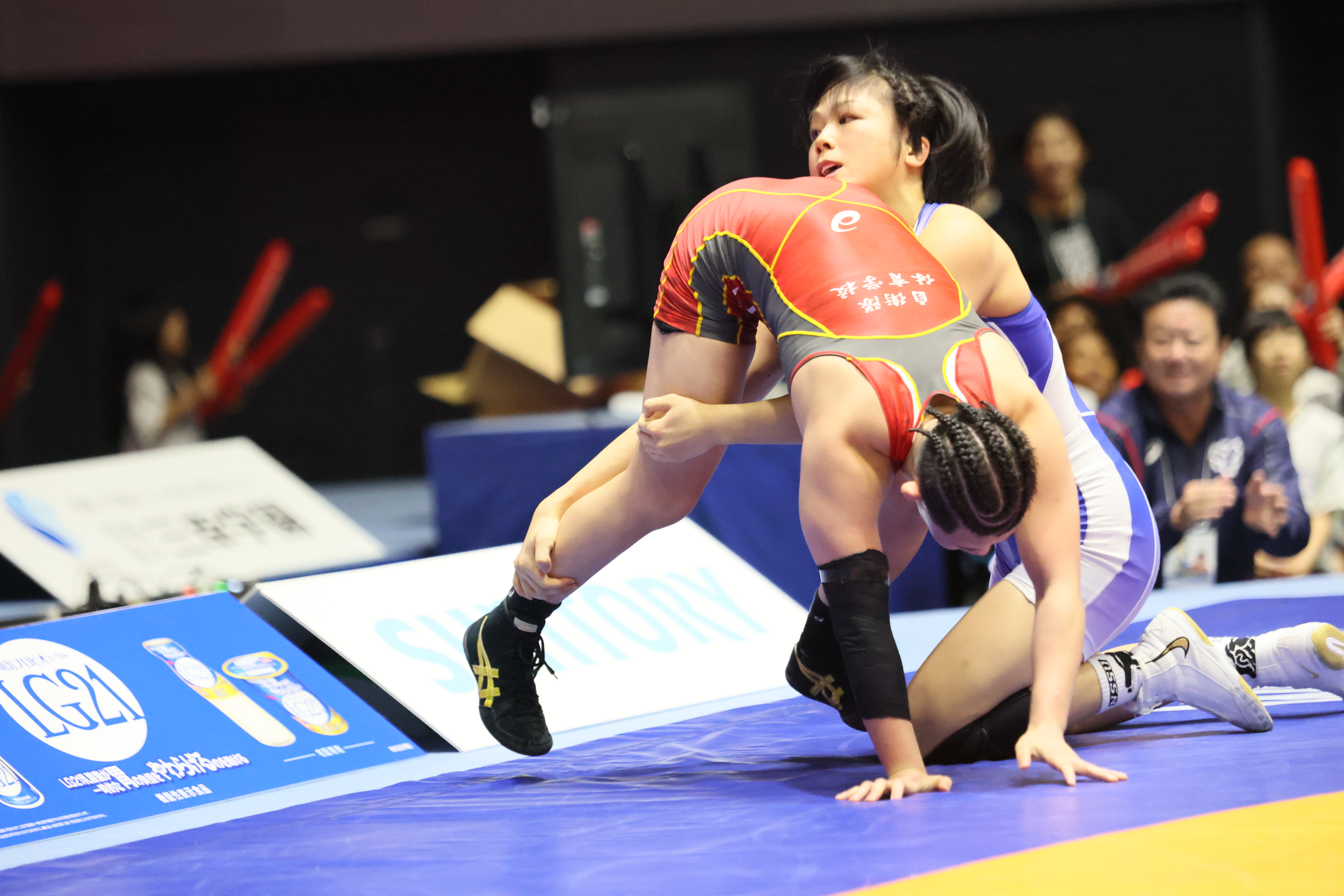 Akari FUJINAMI gets a stepout in the second period of the women's 57kg final. (Photo: Takeo Yabuki / wrestling-spirits.jp)
Akari FUJINAMI gets a stepout in the second period of the women's 57kg final. (Photo: Takeo Yabuki / wrestling-spirits.jp)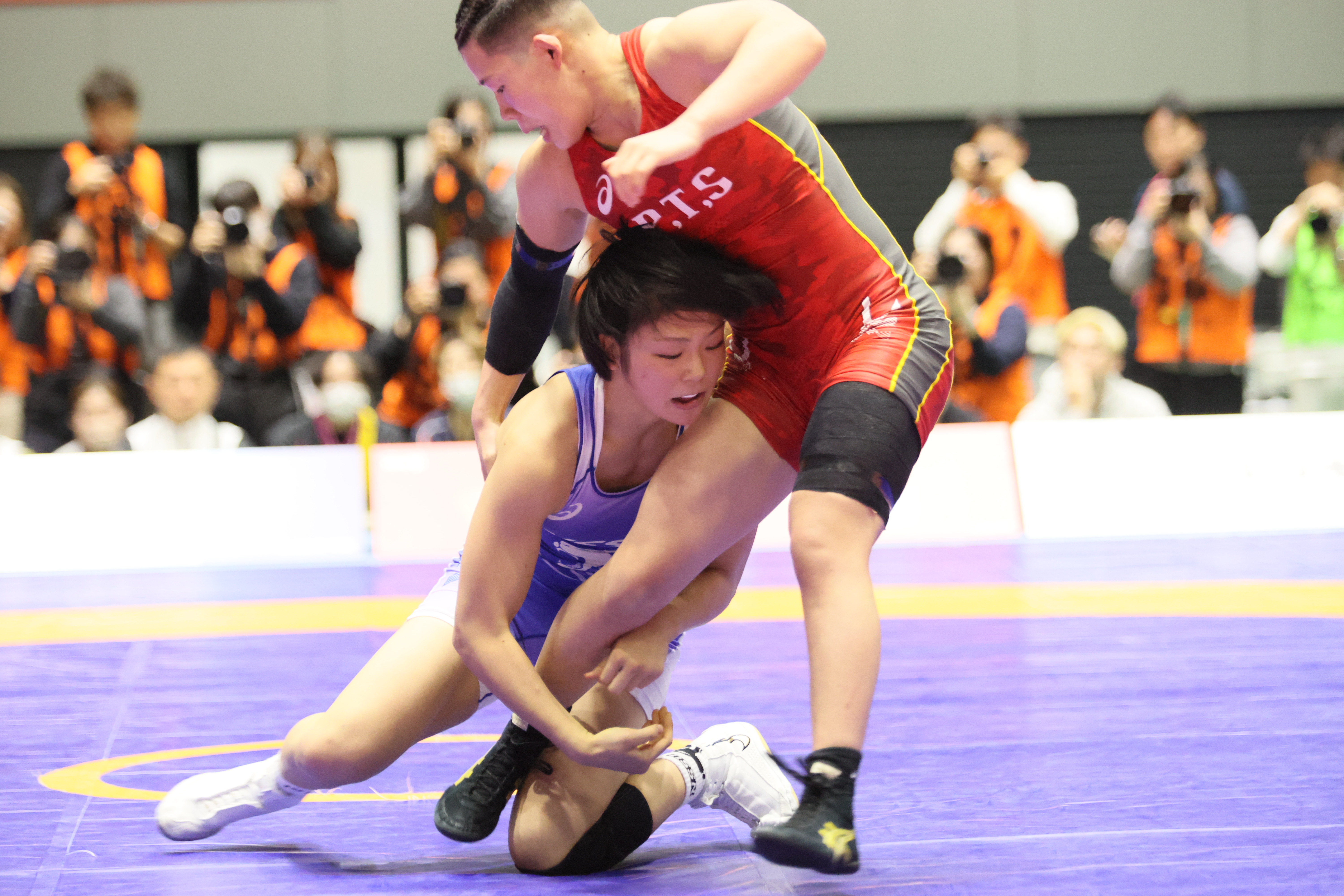 Akari FUJINAMI shoots for the winning takedown against Himeka TOKUHARA in the final minute of the women's 57kg final. (Photo: Takeo Yabuki / wrestling-spirits.jp)
Akari FUJINAMI shoots for the winning takedown against Himeka TOKUHARA in the final minute of the women's 57kg final. (Photo: Takeo Yabuki / wrestling-spirits.jp)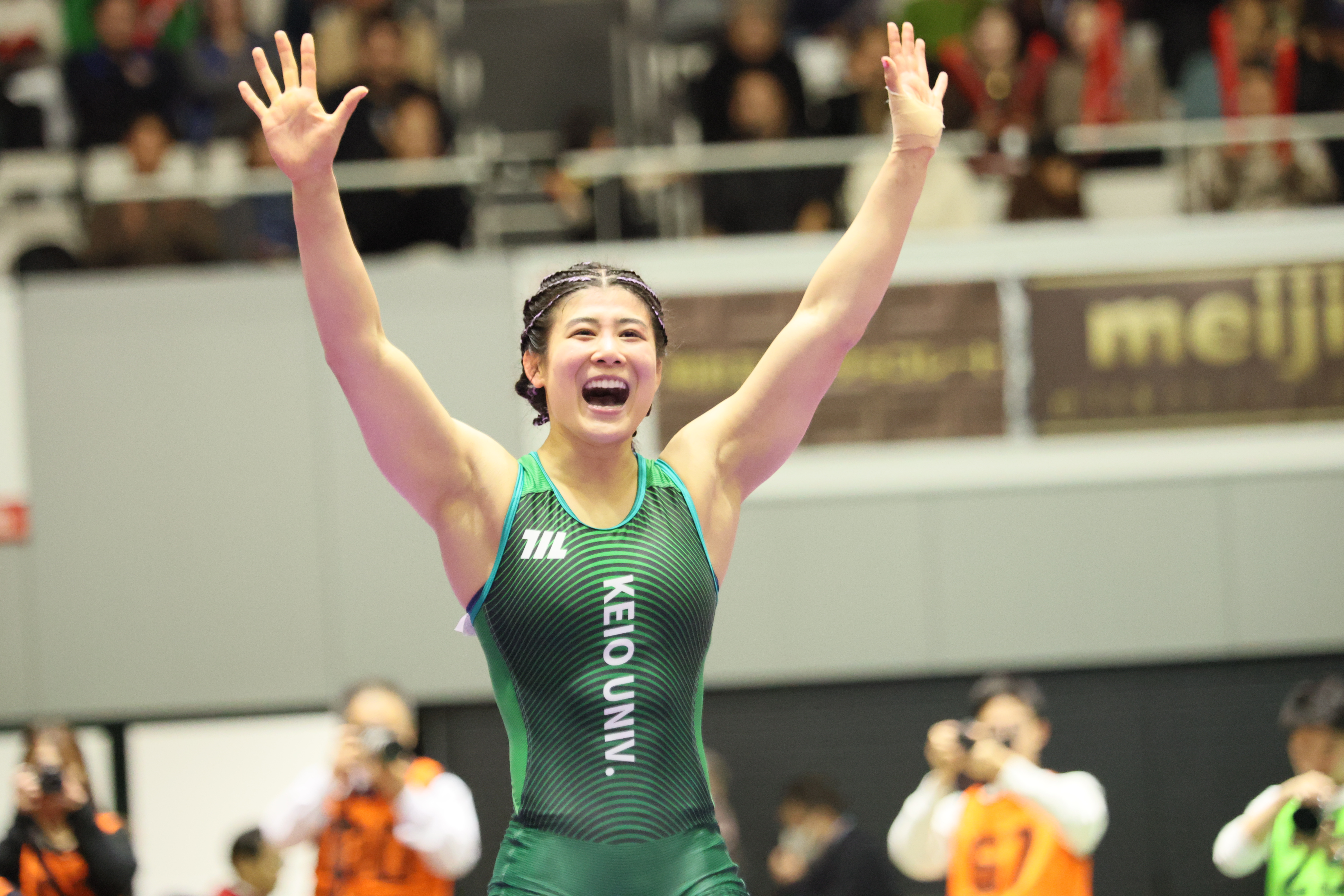 Nonoka OZAKI celebrates her victory over nemesis and Olympic champion Sakura MOTOKI in the women's 62kg final. (Photo: Takeo Yabuki / wrestling-spirits.jp)
Nonoka OZAKI celebrates her victory over nemesis and Olympic champion Sakura MOTOKI in the women's 62kg final. (Photo: Takeo Yabuki / wrestling-spirits.jp)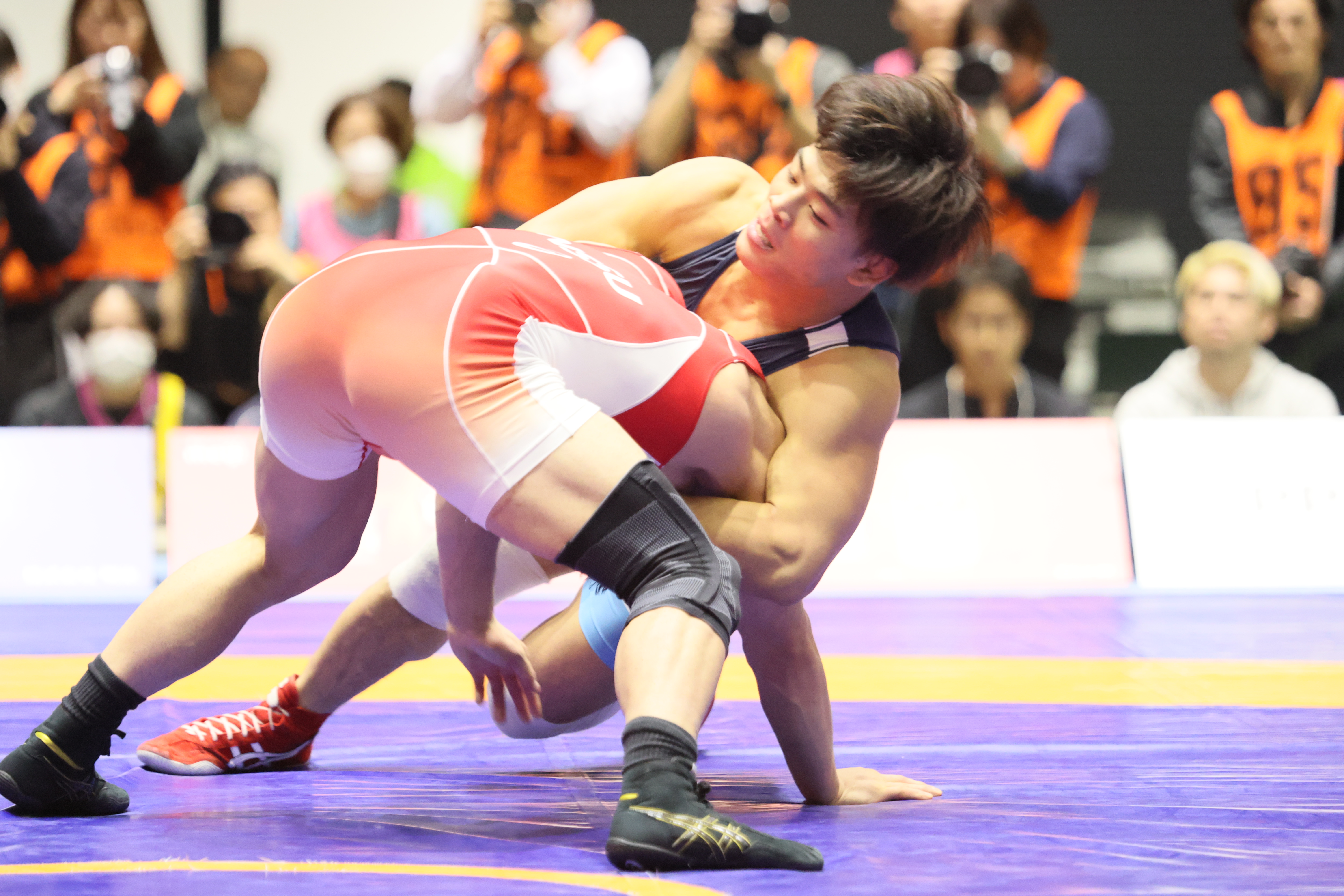 Yoshinosuke AOYAGI unsuccessfully attempts a front body lock roll in the freestyle 74kg final against Kota TAKAHASHI. (Photo: Takeo Yabuki / wrestling-spirits.jp)
Yoshinosuke AOYAGI unsuccessfully attempts a front body lock roll in the freestyle 74kg final against Kota TAKAHASHI. (Photo: Takeo Yabuki / wrestling-spirits.jp)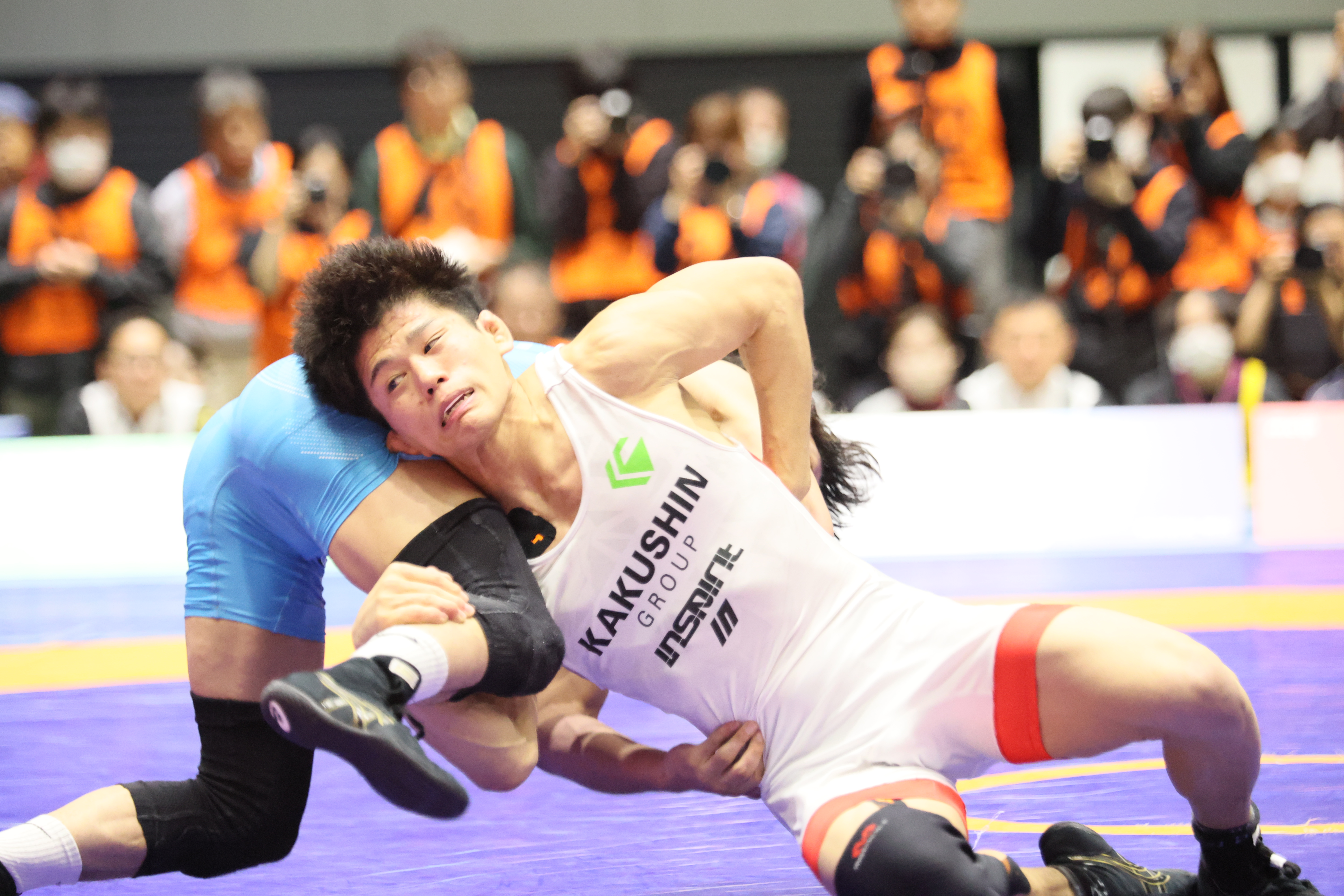 Kotaro KIYOOKA sweeps to the side for a takedown against Takara SUDA in the freestyle 65kg final. (Photo: Takeo Yabuki / wrestling-spirits.jp)
Kotaro KIYOOKA sweeps to the side for a takedown against Takara SUDA in the freestyle 65kg final. (Photo: Takeo Yabuki / wrestling-spirits.jp)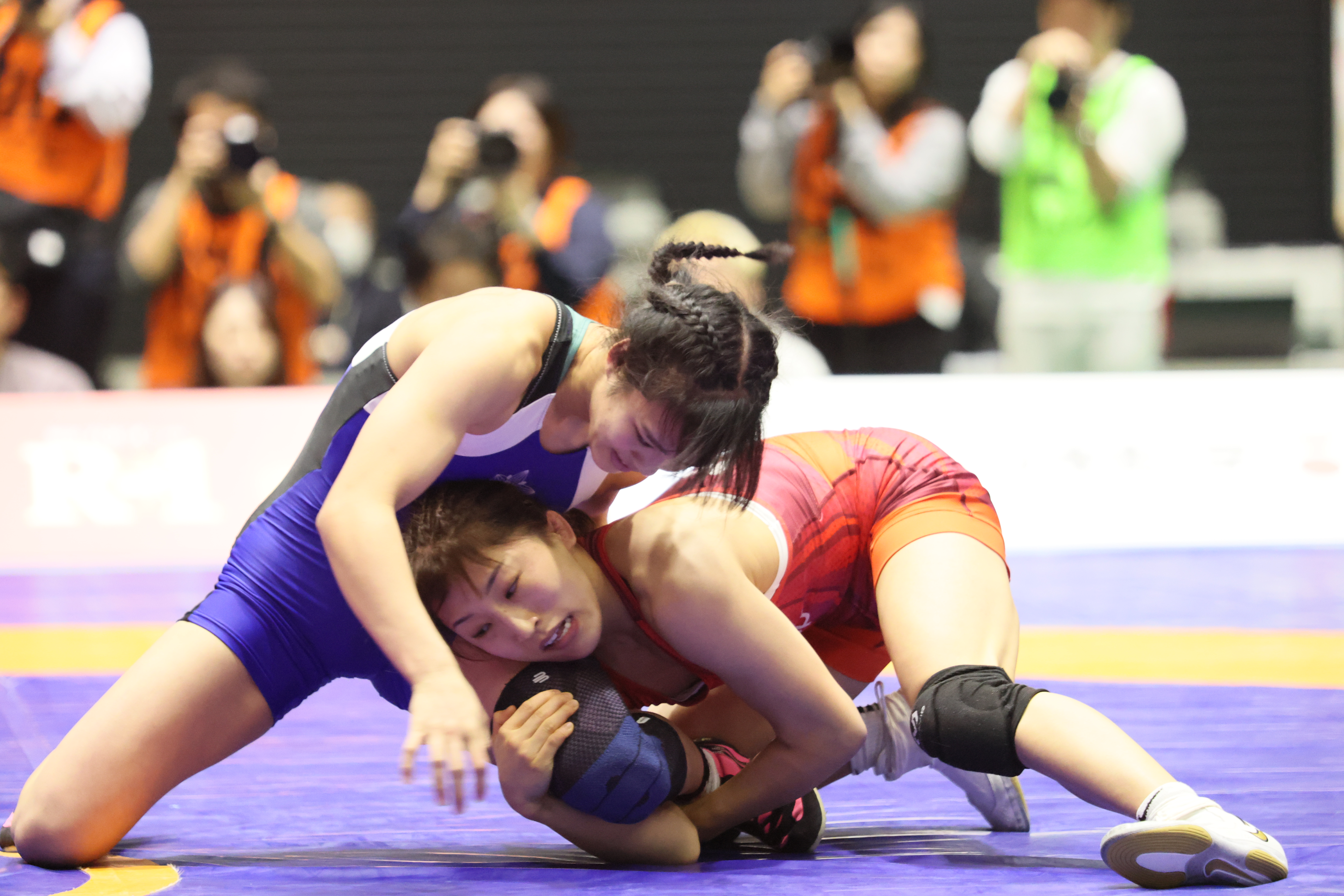 Yui SUSAKI shoots for a takedown against Haruna MORIKAWA in the women's 50kg final. (Photo: Takeo Yabuki / wrestling-spirits.jp)
Yui SUSAKI shoots for a takedown against Haruna MORIKAWA in the women's 50kg final. (Photo: Takeo Yabuki / wrestling-spirits.jp)
Share your thoughts.
Comments